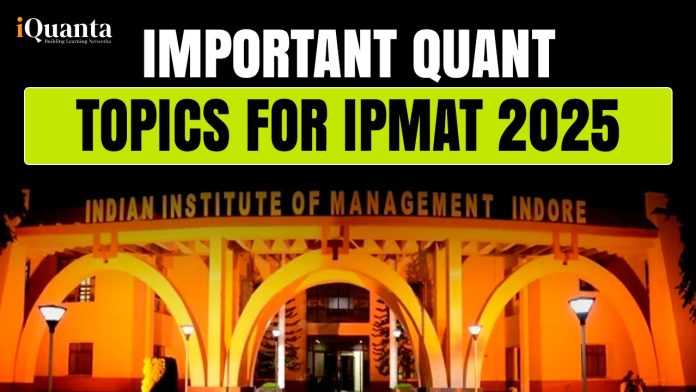The Integrated Program in Management Aptitude Test (IPMAT) is a highly competitive exam that serves as the gateway to prestigious five-year management programs at IIM Indore, IIM Rohtak, and other top institutes. The Quantitative Ability section plays a crucial role in determining your score, testing mathematical aptitude, logical reasoning, and problem-solving skills.

With IPMAT 2025 approaching, it’s essential to focus on high-yield topics that can significantly impact your performance. Here’s a breakdown of the most important topics and how to master them effectively based on practical strategies and personal experiences from successful aspirants.
1. Number System
A strong grasp of the number system helps in solving arithmetic and algebra-based problems quickly. Focus on:
- Properties of integers (divisibility rules, factors, multiples, unit digits, cyclicity)
- LCM & HCF and their applications
- Base systems (Binary, Decimal Conversions, Octal numbers)
- Surds and indices
- Factorials and their properties
- Remainder theorems (Wilson’s theorem, Euler’s theorem)
- Prime numbers and their properties
- Perfect squares and cubes
- Rational and irrational numbers
- Finding the unit digit and last two digits of a number
Preparation Tip: Try solving last year’s IPMAT questions. Many number system questions are concept-based rather than lengthy calculations. One must also practice cyclicity patterns for last-digit questions; they repeat frequently. Use modular arithmetic to simplify remainder problems—Euler’s theorem can be a game-changer if understood well
2. Arithmetic
A large portion of the quant section comes from arithmetic, making it one of the most important areas to master. Key topics include:
- Percentages and their applications (profit-loss, discounts, interest calculations
- Ratio and Proportion
- Averages, Mixtures, and Alligation
- Time, Speed, and Distance (relative speed, trains, boats & streams, circular motion)
- Time and Work (efficiency, pipes and cisterns, wages problems)
- Partnership problems
- Problems on ages
- Profit and Loss (successive discounts, mark price concepts)
Preparation Tip: Try to master percentage-to-fraction conversions to increase speed. Solve time-speed-distance questions using relative speed concepts, as it saves crucial time in the exam and try linking real-life scenarios to these topics, for example, calculating discounts while shopping or estimating travel time based on speed.
3. Algebra
Algebra is essential for solving equation-based problems. Key topics include:
- Algebraic identities
- Linear and Quadratic Equations
- Polynomials and Factorization
- Functions and Graphs
- Inequalities
- Logarithms
- Sequences and Series (AP, GP, HP)
Preparation Tip: Learn factorization tricks to simplify quadratic equations quickly. Graph-based visualization helps in understanding functions and inequalities. Avoid rote memorization of formulas; instead, understand derivations to recall them under pressure.
4. Geometry and Mensuration
A conceptual approach is key to scoring well in geometry. Important topics include:
- Lines and Angles
- Triangles (congruence, similarity, Pythagoras theorem, special triangles)
- Circles (tangents, chords, cyclic quadrilaterals)
- Quadrilaterals and Polygons
- Coordinate Geometry (distance formula, section formula, equation of a line)
- 2D & 3D Mensuration (area, perimeter, volume, surface area)
Preparation Tip: Visual learning works best; draw diagrams even for simple problems to avoid misinterpretations. Aspirants should memorize standard results but also focus on application-based questions. Use symmetry properties in coordinate geometry to simplify calculations
5. Permutations, Combinations, and Probability
Though slightly advanced, these topics can provide an edge if mastered well. Key areas include:
- Arrangements and Selections
- Circular Permutations
- Probability basics and conditional probability
Preparation Tip: Try thinking in terms of real-life probability, like flipping coins, rolling dice, or drawing cards,s to get an intuitive grasp of concepts. Many aspirants struggle with factorial-based questions and should try practicing small cases first before jumping into complex ones
6. Data Interpretation
DI tests your ability to analyze numerical data quickly. Key areas include:
- Tables and Pie Charts
- Bar Graphs and Line Graphs
- Data Sufficiency
- Caselets and Mixed Graphs
Preparation Tip: Approximation skills are critical and don’t waste time on unnecessary calculations. You should also try and develop the habit of quickly scanning charts and graphs before diving into calculations and practice sets with strict time limits to build exam temperament
7. Set Theory and Venn Diagrams
A critical area for logical reasoning and quant. Key topics include:
- Basic set operations (union, intersection, difference, complement)
- Venn diagrams for problem-solving
- Cardinality problems and real-world applications
- De Morgan’s laws
Preparation Tip: Solve previous year Venn diagram-based questions—they have a high chance of repetition. Try breaking problems into smaller parts rather than handling the entire equation at once
8. Matrices and Determinants
For IPMAT, matrices are usually straightforward but should not be ignored. Focus on:
- Basic operations (addition, subtraction, multiplication)
- Determinants and their properties
- Solving linear equations using matrices
Preparation tip: If matrix-based questions appear, they are usually direct—practicing a few examples is enough.Don’t spend too much time on this unless your fundamentals are weak
How to Prepare for Topics for IPMAT 2025 Effectively
- Build Strong Fundamentals First: Start with NCERT books (Class 9-12) for conceptual clarity. If you struggle with basics, don’t rush into problem-solving.
- Develop Exam-Specific Speed Strategies:
- Use approximation techniques to avoid unnecessary calculations
- Learn to skip time-consuming questions—prioritize easier ones first
- Identify shortcut methods and formulae but understand their logic too
- Use Targeted Practice:
- Solve previous 5-year IPMAT papers to get a sense of frequently asked topics
- Don’t just solve questions—review mistakes and note recurring patterns
- Group similar questions together (e.g., all quadratic equation problems) to master one concept at a time
- Take Regular Timed Mocks:
- Start with topic-wise sectional tests before moving to full-length mocks
- Post-mock analysis is more important than the test itself—identify weak areas and refine strategies
- Experiment with different time allocation methods to find what works best for you
- Strengthen Mental Calculation:
- Avoid excessive reliance on calculators and mental math is a must
- Use Vedic math tricks for rapid calculations
- Set time-based goals while solving practice sets.
The Quant Section in IPMAT is a make-or-break factor that can significantly impact your overall score. Excelling here requires strong conceptual clarity, logical reasoning, and efficient time management. Since this section often differentiates top scorers, focusing on high-weightage topics and strategic preparation is crucial. Start early, practice smartly, and stay confident and all the best for IPMAT 2025!


